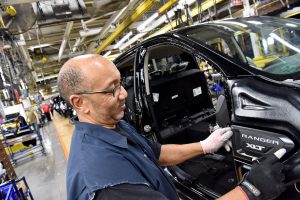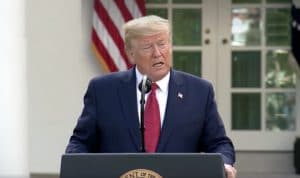
With the extension by President Trump on coronavirus-related restrictions to April 30, automakers are facing rising pressure.
The extension of the rules for social distancing and the shutdown on non-essential businesses through April is certain to intensify the strain on automakers, reducing their cash flow sharply as sales of new vehicles continue to fall precipitously.
President Donald Trump said Sunday he would extend nationwide social-distancing guidelines for another 30 days, an abrupt shift from his push to reopen the country by Easter as the coronavirus pandemic continues to spread throughout the United States, according to The Washington Post. The virus has claimed 2,500 lives and the death toll is expected to continue to climb during the next few weeks.
The 15-day guidelines Trump announced two weeks ago were set to expire on Monday, and Trump suggested over the past week that he was looking to relax them, at least in some parts of the country. He even floated Easter, on April 12, as a potential date by which the country could return to normal.
(2020 Detroit Auto Show cancelled due to coronavirus pandemic.)
But on Sunday Trump said he had decided to extend the guidelines – which include suggested limits on large gatherings – to April 30, a sign his earlier predictions were overly rosy, The Post said.

President Donald Trump discusses his decision to extend coronavirus-related restrictions until April 30.
The extension of the federal guidelines also means plant shutdown that some carmakers had hoped to curtail by the middle of April will now be extended. FCA, Ford and Toyota said last week they hoped to resume production by April 14.
TheDetroitBureau.com has spoken with a number of automakers since Trump’s extension. While none of them had firm plans to change their production schedules, three of them are now reviewing those plans.
GM, Ford and FCA, however, have been building medical equipment, including protective gear and ventilators, needed by doctors and nurses caring for patients ill from the virus, which has spread around the world since it was discovered in China last year.
(Car dealers struggling to cope with coronavirus turn to online, “touches” car sales.)
The extensions of the shutdowns are certain to have an adverse impact on the credit rating of several companies – among them Ford, GM and FCA – making it more expensive for them to borrow money for foreseeable future. Once a downgrade is in place, it takes several profitable quarters to reverse.
Carmakers such as GM and Ford have already ordered rollbacks of executive pay and steep cuts in the compensation of salaried workers, bracing for the economic shock wave created by the rapid spread of the virus, which has forced economic activity in several major cities to a standstill.
Other companies such as Fiat Chrysler Automobiles N.V., Volkswagen, Toyota, Nissan and Daimler also are bracing for the economic fallout, which is wiping out any potential profit this year and eating into cash reserves at a rapid rate, forcing carmakers to utilize expensive lines of credits.
Governments in China, Europe and the United States are prepared to offer additional cash and credit to car companies but it’s unclear, at this point, whether there will be enough room in the lifeboats, at this point, for dealers and supplier, operating on thin margins.
(Analysts warn auto sales forecasts looking dire.)
Carmakers, pressed to conserve cash, are also being forced to make painful decisions about spending on research and development, particularly on autonomous vehicles. For example, Waymo, Alphabet’s AV unit, announced it plans to suspend testing of AVs without safety drivers, while FCA announced it idled some 2,000 contractors, working on a variety of future projects and halted work on a new assembly plant in Detroit.

